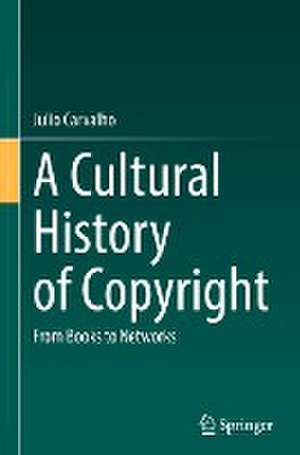A Cultural History of Copyright: From Books to Networks
Autor Julio Carvalhoen Limba Engleză Hardback – 27 noi 2023
Combining philosophical and historical perspectives, this book focuses on the rise of a legal institution that has dominated the economy of knowledge ever since it burst onto the scene at the dawn of modernity in the heartlands of Europe. From the age of print to the age of networks and disruptive technologies, this book explores the place of copyright amid the various conceptual transformations it has undergone over time. Uniquely, it presents an in-depth philosophical treatment of the cultural history of copyright from its beginnings to the present.
Although copyright is a central topic, the content is by no means limited to it. The main question the author seeks to answer is: how do legal institutions emerge and how do they evolve over time? Though copyright is a wonderful example for tackling this question, a selection of other institutions, such as the social practice of promising in eighteenth-century Britain, are also addressed at considerable length. What the author has managed to show in this book is that the transformations which modern law has undergone since the eighteenth century are inextricably linked to those which have shaped the modern subject to the core. Law forms part of those great schemes of intelligibility that allow us to understand ourselves better. We need to delve deep into the multiple layers of culture if we want to fully understand how the morphology and cultural archaeology of our legal institutions intertwine.
Preț: 780.68 lei
Preț vechi: 952.05 lei
-18% Nou
149.40€ • 162.23$ • 125.50£
Carte tipărită la comandă
Livrare economică 22 aprilie-06 mai
Specificații
ISBN-10: 3031468538
Pagini: 148
Ilustrații: X, 148 p.
Dimensiuni: 155 x 235 mm
Greutate: 0.4 kg
Ediția:1st ed. 2023
Editura: Springer Nature Switzerland
Colecția Springer
Locul publicării:Cham, Switzerland
Cuprins
1. Introduction: ‘Don’t think, look!’, said Wittgenstein. But Where to Look From?.- Part I.- 2. The British Landscape.- 3. Copyright in Eighteenth-Century Germany.- Part II.- 4. The Social Ontology of Legal Institutions.- Part III.- 5. Going Digital.- 6. Out of Joint.- Part IV.- 7. The Contextualism of Law.
Notă biografică
Julio Carvalho completed his PhD summa cum laude in legal theory and intellectual property law at Goethe-Universität Frankfurt in 2022, the same university where he obtained an LLM degree in legal theory in conjunction with the European Academy of Legal Theory in 2017. His research activity has centred on law & tech, law & literature, media and private law theory, philosophy of law and legal theory in both the Analytic and Continental European traditions. His scholarly work has been published in journals such as Rechtstheorie, Archiv für Rechts- und Sozialphilosophie, and Rechtswissenschaft.
Textul de pe ultima copertă
Combining philosophical and historical perspectives, this book focuses on the rise of a legal institution that has dominated the economy of knowledge ever since it burst onto the scene at the dawn of modernity in the heartlands of Europe. From the age of print to the age of networks and disruptive technologies, this book explores the place of copyright amid the various conceptual transformations it has undergone over time. Uniquely, it presents an in-depth philosophical treatment of the cultural history of copyright from its beginnings to the present.
Caracteristici
Offers an answer to the question "How do law and culture weld together?"
Engages in a philosophical examination of the cultural history of copyright over the course of time
